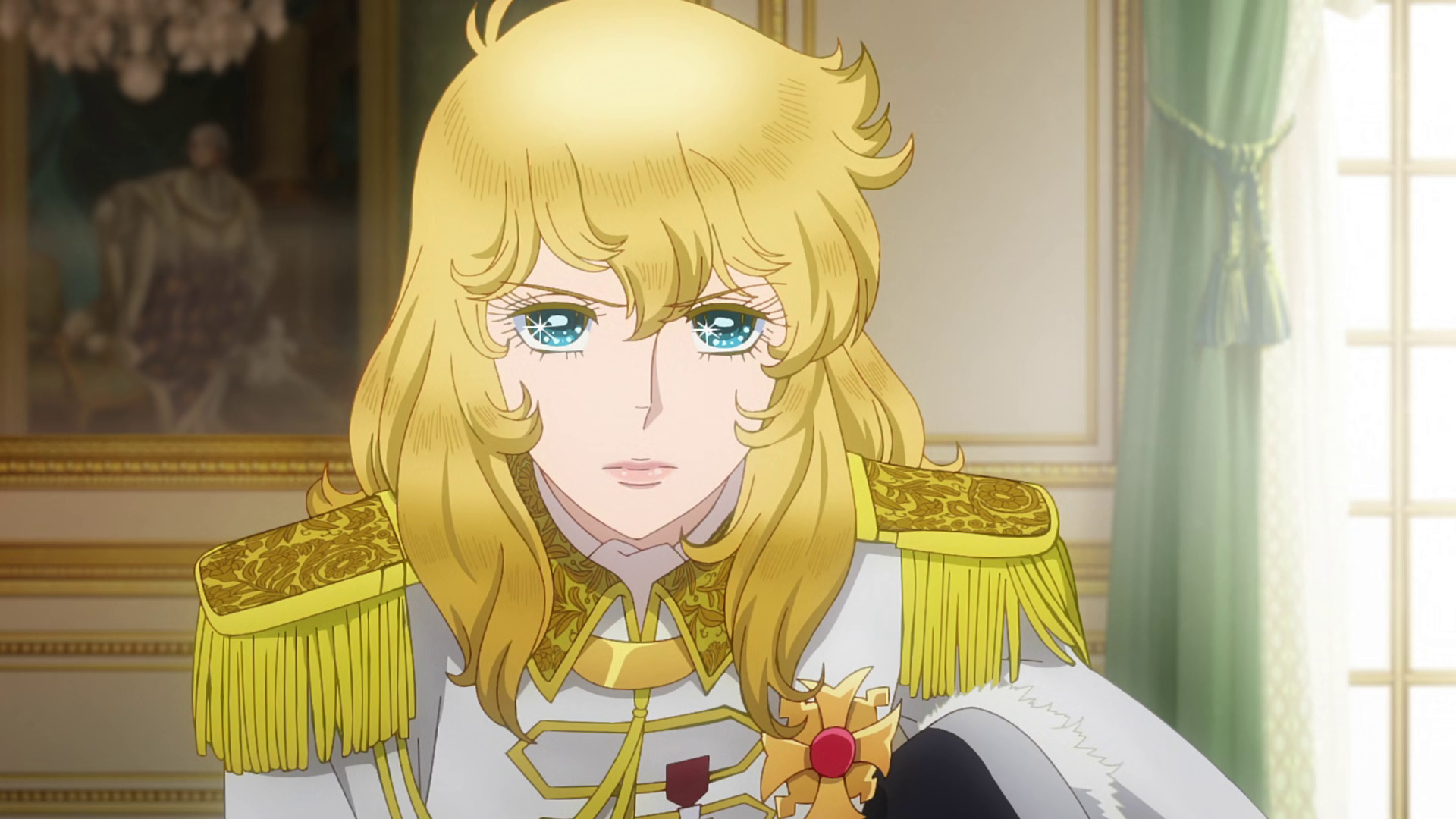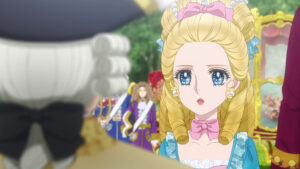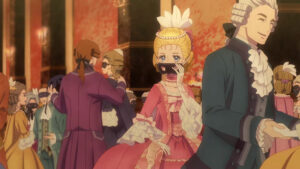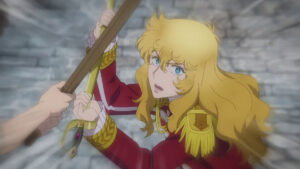


If Marie Antoinette had truly intended to enrage the commoners, she would’ve likely started singing about her romance instead of suggesting dessert. Such is the setup for Netflix’s new adaptation of The Rose of Versailles – beloved historical fiction that’s been given a modern update from MAPPA, one of the most well-known and beloved active studios. Unfortunately, the pretty visuals do very little to justify its existence, as it jumps through a complex story with off-putting musical numbers and droning romance, rather than giving Lady Oscar’s stunning command in a time that was against her the treatment it deserves.
 The original Rose of Versailles is a ten-volume manga, previously adapted into a 40-episode series, which is well-loved to this day. While there is some chance that this story could have been handled decently as a film, a lot of that hope goes out the window in the first five minutes, when the serious tone of the original story is completely abandoned for an opening number with character poses and flower backgrounds. And this is where many fans of the original may turn away in horror – yes, they gave The Rose of Versailles the full modern shoujo aesthetic treatment, complete with big eyes and goofy expressions at times. The visuals themselves aren’t the problem (more on that later) – it’s how jarring they are compared to the original series. While The Rose of Versailles is a shoujo, it is one that was well-known for being groundbreaking in the genre for pushing the demographic older and not looking like the rest of the crowd. In this form, it looks like many others in its demographic.
The original Rose of Versailles is a ten-volume manga, previously adapted into a 40-episode series, which is well-loved to this day. While there is some chance that this story could have been handled decently as a film, a lot of that hope goes out the window in the first five minutes, when the serious tone of the original story is completely abandoned for an opening number with character poses and flower backgrounds. And this is where many fans of the original may turn away in horror – yes, they gave The Rose of Versailles the full modern shoujo aesthetic treatment, complete with big eyes and goofy expressions at times. The visuals themselves aren’t the problem (more on that later) – it’s how jarring they are compared to the original series. While The Rose of Versailles is a shoujo, it is one that was well-known for being groundbreaking in the genre for pushing the demographic older and not looking like the rest of the crowd. In this form, it looks like many others in its demographic.
This soundtrack is something to behold, and I don’t mean that as a positive. Lyrics like “Champagne, lots of chocolate/I wanna play, have fun all the time” and “Follow the way, the only way, ‘cause the traditions are strict/But every day, we get to play, tea party, dance and music” suggest just how unserious they’re taking this, and for whatever reason they didn’t find people who could compose or sing either. There is no conceivable reason why this should have been a musical – it could’ve been to make it easier to recap some of the story, but most of the lyrics are nonsensical croons about love and tea parties, rather than adding to the story in any way. The Japanese music is generic, but slightly more bearable – the closing credits are the first appearance of someone who can sing, because they’re kept in Japanese. What was the point of dubbing the music in the first place, a practice that became increasingly unpopular for dubs in recent years?
 The majority of the runtime that isn’t composed of AMVs that are somehow inside the movie is focused on Oscar and Marie, much as the original manga and anime are – yet, just as fast as their relationship develops, the two are pulled apart. There is no time to see their friendship evolve and then grow strained as there is in the source material. Marie practically becomes a different person overnight – she has one significant conflict with Oscar in the story we see, and the next time we see her, she’s every bit the selfish noble that Oscar feared. Furthermore, without spoilers, their story is left unresolved, though those who know their history know Marie’s ultimate fate.
The majority of the runtime that isn’t composed of AMVs that are somehow inside the movie is focused on Oscar and Marie, much as the original manga and anime are – yet, just as fast as their relationship develops, the two are pulled apart. There is no time to see their friendship evolve and then grow strained as there is in the source material. Marie practically becomes a different person overnight – she has one significant conflict with Oscar in the story we see, and the next time we see her, she’s every bit the selfish noble that Oscar feared. Furthermore, without spoilers, their story is left unresolved, though those who know their history know Marie’s ultimate fate.
The original story has been stripped of everything but essentials, as well as much of its original commentary on politics and gender. Instead, a narrator jumps through events years at a time, skipping any build-up of tension and emotion to get to the next ear-grating attack on fans of the original story. Despite Oscar and Marie’s closeness, the film decides to tsk-tsk at any shippers by placing far too much emphasis on the various suitors of Oscar and Marie and dramatic cries of “What is this pain inside of my heart? Will the blade of love ever remove its dagger from me?” (That may not be an exact quote, but it’s not an exaggeration either.) The story finally does start to regain focus within the last half-hour, and has some moments that perhaps would have emotional impact in the context of the full story, but, again, why would you watch this with the better options available? Are new fans that resistant to “old” anime?
 If there’s one positive thing about the film, it does look pretty. Oscar’s updated design is well-done, adding a touch of a modern shoujo aesthetic to her without completely stripping her of her masculinity. Yet, at the same time, the sheer amount of flowers and colorful backgrounds feels like a cheap copout when so much of the film takes place in extravagant royalty. It’s an interesting choice for MAPPA to lean so heavily into the shoujo aesthetic as well – their only prior shoujo adaptation, Banana Fish, is similarly well-known for being unusual for the demographic, and no one would ever guess it was a shoujo from the anime.
If there’s one positive thing about the film, it does look pretty. Oscar’s updated design is well-done, adding a touch of a modern shoujo aesthetic to her without completely stripping her of her masculinity. Yet, at the same time, the sheer amount of flowers and colorful backgrounds feels like a cheap copout when so much of the film takes place in extravagant royalty. It’s an interesting choice for MAPPA to lean so heavily into the shoujo aesthetic as well – their only prior shoujo adaptation, Banana Fish, is similarly well-known for being unusual for the demographic, and no one would ever guess it was a shoujo from the anime.
Overall, The Rose of Versailles’ biggest flaw perhaps comes from how unnecessary it is. While the series perhaps shows its age in animation, the story is much better executed when the characters aren’t stuck posing in front of flowers in the middle of an impromptu musical number. The original manga and anime tell a genuinely compelling story of historical fiction, with some truth to the era and how Marie became the infamous figure she is today. The film attempts to touch upon some of those notes towards the end of its runtime, but by that point, it’s too little, too late.
The Rose of Versailles (2025) is currently available for streaming on Netflix.
Discuss this review on the Toonzone Forums!
The post Review: “The Rose of Versailles (2025)”: An Unnecessary “Fresh” Coat of Paint appeared first on Anime Superhero News.